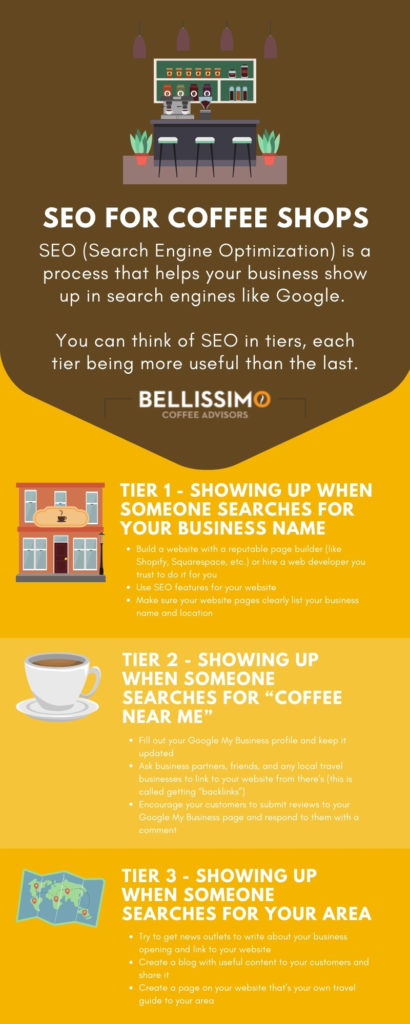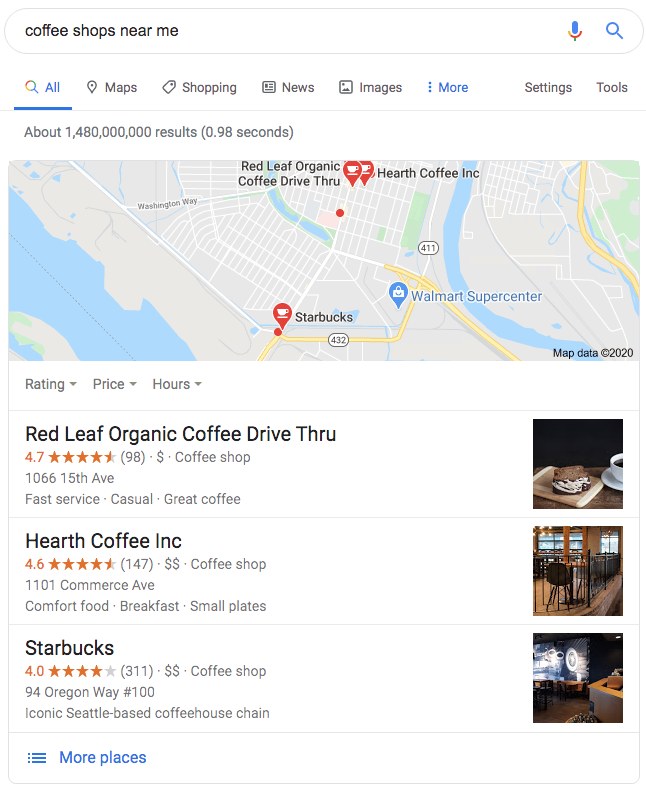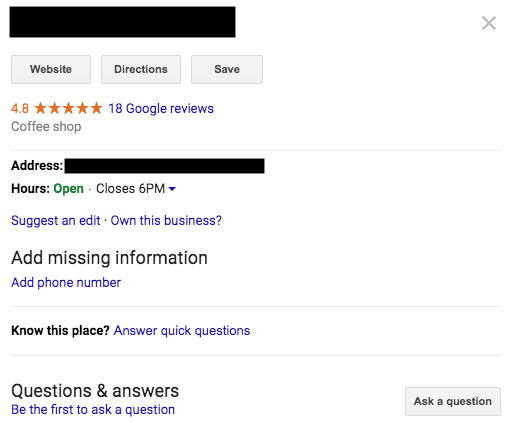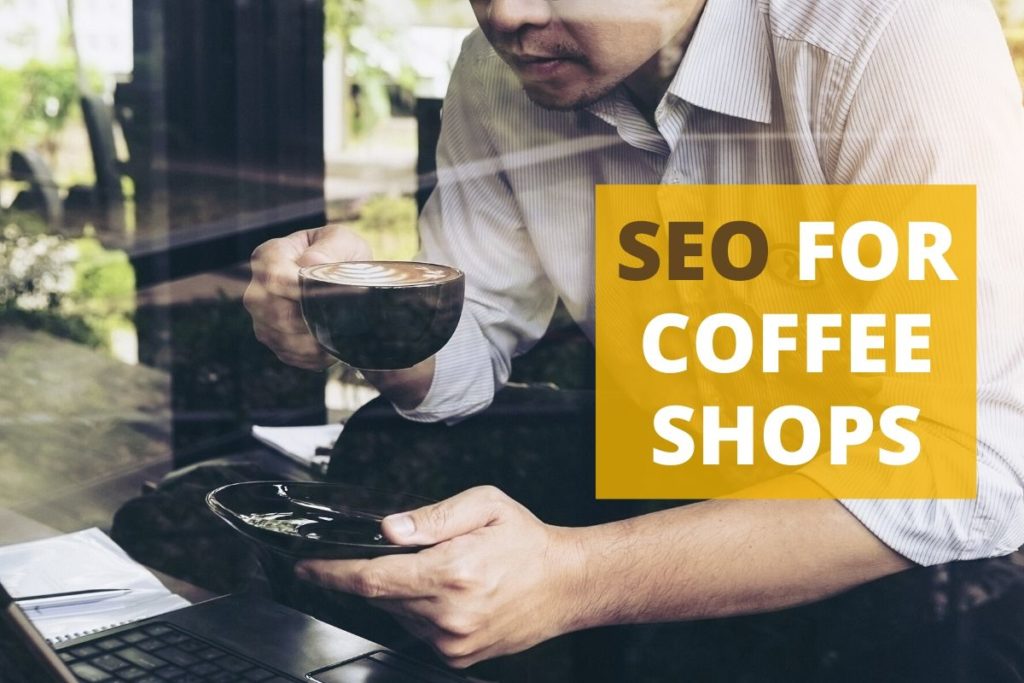If you’re thinking about opening a local business or already in operating, you may have heard that you should care about SEO. Search Engine Optimization (SEO) has a positively WILD amount of information, misinformation, and straight-up snake oil out there about what it is and how to do it. Even worse, most of the information is for huge businesses with content teams, not a small business owner with maybe an extra hour here or there if they’re lucky. Should a small business owner even care about SEO?
You should, but probably not how people are telling you to.
We’ll walk you through simple SEO steps you can take right now and be set up better than 90% of other local businesses. Because of our site we’ll be talking about coffee shops, but these tactics can apply to any small local business.
What is SEO?
Search Engine Optimization is the process of working to get your business to show up when someone searches for something related to your business. For example, if someone searches for “best coffee near me”, you would benefit from showing up as one of the top results.
SEO very basically involves two main parts
- Helping search engines (like Google) understand what content is on your website
- Getting search engines to recognize that your content is better than your competitors’ content.
Step 1 is much easier, but luckily, it’s the main step worth doing for coffee shops. Making sure your site is technically solid from a search engine’s perspective is already more than many of your competitors are doing, and you are likely to gain business from taking a few simple steps we outline below.

What is local SEO?
There are many, many factors that affect SEO, but about 70% of them don’t matter for a local coffee shop. Local SEO is simply SEO on a local scale, i.e. dominating search results for just your area.
Focusing on local SEO is a strategic move for coffee shops for three reasons:
- A local coffee shop is likely to only really care about local searches anyway
- There is far less competition for local SEO than national or worldwide SEO
- Local SEO is much easier to understand
A lot of SEO involved extensive research and planning, but local SEO doesn’t require much research at all. You’re probably ready to do it right now. Simply think about your location and how people might find your shop nearby. Most of the time it will be from searches like:
“coffee near me”
“coffee in [your town]”
“coffee shop” or “cafe”
Then if you want to get slightly more creative, think about your core demographic and other qualities they might care about in your coffee shop. For example, students might care about good wifi and a relaxed atmosphere. Parents might want kid friendly menu options.
Also think about more city specific names. For example, greater Portland is often referred to by more specific neighborhoods like Alberta, Sunnyside, Hawthorne, etc. So a Portland coffee shop in the Hawthorne area should mention their neighborhood specifically on their website. Many other urban centers work the same way.
Just don’t overthink this. You want to cover your bases plus a few more niche cases, and that’s enough.
You’ve got a coffee shop to run, after all.
How expensive is SEO?
SEO can be expensive, but it doesn’t have to be. To rank nationally it will either take a lot of time to learn how, or a lot of money to hire a professional, but local SEO is different.
How to do affordable local SEO

Google My Business
Google My Business is the single most useful service a business owner can use to improve their SEO. Google My Business creates a listing for your shop that works when people search with text or use Google Maps to search for locations. Often, these results appear at the very top of searches, making them even more valuable than other SEO strategies when it comes to local business.
To sign up for Google My Business, simply click “Manage Now” and fill in your business information.
Note: Make sure your business does not already have a My Business listing! If your business has been around for a while, listings are sometimes generated automatically. Search for your business and if you see a listing that looks like this, it’s a My Business listing. Instead of creating a new listing, click “Claim this business” or “Own this business?”.

Google will send a postcard to your business address with a verification code. Verify yourself as the business owner and then fill in as much information as possible. Google prefers businesses with more complete business listings. If you invest a little more time to make sure everything is filled out correctly, pictures are added, and your menu is easily accessible, Google will love to show your business.
Also, make sure this information stays up to date. If you’re changing your hours, you must update it in Google My Business. Often a business owners updates their hours, forgets to change the listing, and customers are confused and frustrated because they looked up whether the shop was open, confirmed it was, but now that they’ve made the trip out it’s not. We have seen this countless times. Keep your contact information, hours, and menu up to date!
Your website content
Depending on how you built your website, SEO may be more or less complicated, but you only need to worry about a few things.
Headings
Without getting too much into the nitty gritty, websites have things called headers which are just like titles and subtitles. Google reads these and uses them to determine what your site and pages within are about. Make sure your headings are accurate and try to work in some that include your city’s name. For example, if you have a heading that says “Specialty Coffee”, consider changing it to “Portland Specialty Coffee” (if you’re in Portland like us).
Note: Do not keyword stuff. Keyword stuffing is putting in a lot of terms you think people are searching for unnaturally. Having a heading that says “Coffee Coffee Shop Cafe Best Deals” is keyword stuffing. This used to be a popular tactic in the early days of SEO, but Google is good at recognizing it now and will penalize you. Keep it simple and natural.
Content
The content on your page isn’t as crucial as your headings, it’s just important that it makes sense. Make sure you’re not making any false claims and that information customers want is easily accessible e.g. your location, hours, menu, etc.
Pages
The address of your pages is also important to SEO. It’s best to think about this as early in the process as possible and just try not to change things too much. Most cafes only need a few different pages: Home, Menu, Location, About, Contact. Maybe a handful of others. If you decide you want your About page to be ‘yourwebsite.com/about’ don’t change it to ‘yourwebsite.com/our-story’ down the line. It matters less what your pages are called, but more that they have consistent names.
A press release
One way search engines determine whether or not your website is high quality is by looking for other high quality websites and seeing if any link to your site. This is called a backlink. A backlink tells the search engine that a trustworthy site is recommending your site, and your site is probably trustworthy too.
Backlink hunting is a chore that is not worth the time of a busy business owner, but there is one trick local businesses can use: press releases. Especially in small towns, any local news sites will usually be more than happy to publish that your shop is opening or any other big events you have going on.
This happens through a press release: a simple page or two document that you write and give to press, letting them know something potentially newsworthy is happening.
Aside from the obvious publicity benefits, the crucial part of this for SEO is including a link to your website in the press release. Most publications are happy to link to you when the story is about your business, and it can be an incredibly efficient way to earn backlinks for your website. So much so that getting a handful of publications to link to you every year or so is able to build some serious credibility with Google, and that’s all the backlink hunting you have to do.
Much, much easier than manually looking for websites to link to you.
Note: Some publications will link to you but only with a ‘nofollow’ link. This isn’t ideal from an SEO perspective, but it is still beneficial. Don’t be discouraged if this term comes up.
Leverage relationships
If you’re looking to take your SEO one step up and willing to spend a slightly more time: ask your friends to link to your site. When we say friends, it’s important that it’s another trustworthy business linking to you, not just someone on Facebook (Facebook links are still useful, just not so much for SEO). If you have another friend in business though, then by all means ask if they’ll find a place to link to you on their site. For example, they could create a simple section on their About page called “Our friends” and link to you, or if they have a local recommendations area they could link to you there. A few of these links will also go a long way for local SEO, and they’re much easier to get than reaching out to strangers.
Ask for customer feedback
The last but no less crucial way to improve SEO for local business is to ask for reviews on Google, Facebook, Yelp, and any other business rating services you notice are popular in your area. Especially in the modern age of the internet, reviews and recommendations (“social proof” if you want the fancy marketing term) are increasingly one of the biggest factors in a potential customer’s buying decision. Customers are often willing to review coffee shops organically, but it doesn’t hurt to encourage them at the end of their transaction. You can also empower your baristas to decide who to remind about reviews. If they think a transaction went particularly well or a customer has become a regular, that’s a great time to ask for a review.
Importantly, it is against most review sites’ Terms of Service to offer financial incentive for a review. Some coffee shops do it and get away with it, but it is entirely possible for the site to remove all those reviews overnight. It’s best to ask customers in person and organically, or add a reminder to their receipt. If you send receipts digitally, you may even be able to include a link directly to where a customer can leave a review. For example, you can create a short name on Google My Business.
Always respond to reviews as well. It may seem tedious, but simply set aside a short block of time every day or week (depending on the frequency of your reviews) to respond to all your reviews, positive or negative. Responding to positive reviews is easy, simply thank them and move on. Responding to negative reviews is harder, but more important. Make an earnest effort to hear the complaints and resolve them (assuming the complaint is reasonable). It can be hard to hear criticism, but the person leaving the review is probably not the only customer to ever have a complaint, they’re just the first one to verbalize it. Accept criticism graciously, and use it as an opportunity to improve your business.
A note on Yelp: While Yelp remains a popular business rating service, we have heard from numerous coffee business owners about pestering calls and less than fair practices. We don’t recommend ignoring your Yelp reviews, but don’t obsess over them either. Google reviews are nearly always displayed first, and they should be your biggest focus.
How important is SEO at the end of the day?
Important.
But hopefully now you understand how to do a little work for a lot of SEO benefit. You can get far deeper into the rabbit hole of SEO, but it’s just not necessary for most coffee shops. By strengthening your online presence, you’re potentially securing 82% more customers. Check out this Forbes article on ROBO economy for more information. Suffice to say the internet is not going anywhere and your online presence is only going to get more important.
More Articles For Coffee Business Owners
Free and Low Cost Marketing For Coffee Shops
So you want to open a coffee shop but money is tight. How are you supposed to get your name out there without spending a lot? Thankfully, there are a lot of ways for coffee shops to advertise freely or very cheaply. Crucially though, you should still get in the habit of setting a budget. … Free and Low Cost Marketing For Coffee Shops Read More »
Small Coffee Business Advertising on Facebook and Instagram
Stop clicking the boost button! Never, ever click this blue button again. This button may as well say, “Just take my money”. If you’ve clicked this button, it’s okay. Don’t blame yourself. Facebook makes it sound appealing on purpose. “Just click this little button, pay a few bucks, and your post will be seen by … Small Coffee Business Advertising on Facebook and Instagram Read More »
Effective Coffee Shop Signage
The goal of signs are to get people’s attention and to create enough intrigue to want to buy something. Great signs are usually bright, colorful, use large font, and are very easy to read. We usually only think about signs that are on the outside of buildings that get people into stores, but store signs … Effective Coffee Shop Signage Read More »

